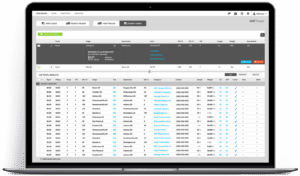by Kamal Makhmudov
In this guide, I will take you through the steps of how to become a dispatcher for truck drivers and offer some useful tips on how to run a successful truck dispatcher business. You’ll learn:
- What exactly a truck dispatcher does
- The steps to become a truck dispatcher
- Where to find carriers and loads
- How to get the training you need to succeed
What Does a Truck Dispatcher Do?
A truck dispatcher’s job is essentially to manage freight on behalf of a carrier. That includes using load boards and personal connections to locate freight that needs to be shipped, speaking to brokers, conducting negotiations, and eventually dispatching drivers and setting up their routes. In many cases, the position also includes some back-end work like reviewing truck drivers’ logs and tracking their hours.
A truck dispatcher is often confused with a freight broker, but the two positions have different and distinct roles. A broker is a legal entity that serves as a middleman between the shipper or manufacturer (who needs their freight moved) and the carrier (who can move that freight). The freight broker is legally allowed to represent both the carrier and the shipper at the same time, but they should never have a personal investment in either side.
Unlike a freight broker, a truck dispatcher is directly affiliated with a carrier and is consistently working on their behalf. Even if you are an independent freight dispatcher, you are still essentially an employee of whichever carrier you are currently working for and whenever you conduct negotiations with a freight broker, you do so on behalf of the carrier. Unlike brokers, freight dispatchers are not legally allowed to represent shippers or manufacturers.
A freight brokerage business is required to have freight broker authority through the Federal Motor Carrier Safety Administration (FMCSA) and a freight broker bond (surety bond), among other requirements. If you’re interested in starting a freight brokering business, visit DAT’s Freight Broker Startup Guide for more information and more freight broker training resources.
How to Become a Truck Dispatcher
People often wonder, “How do I become a semi-truck dispatcher?” The answer to that question begins with a follow-up question: are you looking at becoming a truck dispatcher for another employer or as an independent business opportunity?
If you simply want to become a truck dispatcher for another company, then the process is much the same as it would be for finding any job. You can look on job boards to see if there are any open truck dispatcher positions that interest you, or you can approach individual carriers and express your interest in becoming a freight dispatcher. You can ask if they’d be willing to train you or if they can offer you some kind of entry level position.
Requirements will vary, but many employers will at least want a high school diploma or GED and some customer service experience. Many people are perfectly happy working as an employee of a single company rather than as an independent truck dispatcher.
However, things get even more interesting for those who view becoming a truck dispatcher as a business opportunity. If you want to become an independent truck dispatcher, the first thing you need is education. People often think they can jump right into starting their own business, but the truth is that you need to start with training that focuses both on the basic information around truck dispatching and how to promote your company.
Once you have a grasp of truck dispatching and of how you want to operate your business, you can follow these steps to become an independent truck dispatcher:
Step One: Register Your Business
Starting out as a truck dispatcher begins with choosing your name and officially registering your business. When naming your business, the key is to be short and to the point. I recommend that you include terms like “independent dispatch” or “dispatching services” in your name so that it will be easier for people to find you. Having a clear name also means potential customers will know exactly what your business does when they come across it. Too many dispatchers use names like “trucking” or “logistics,” which don’t actually give any information on what their business does.
Once you have a name for your business, you need to apply for your Employer Identification Number (EIN) with the IRS and determine your business structure. Options include a sole proprietorship, limited liability company (LLC), corporation, or partnership. I typically recommend applying for an LLC or Inc. structure.
You should also create drafts of some of the contracts that will be essential to your business function. That includes the service agreement, where you state what you are charging and what services you will provide for that fee, and the dispatcher-carrier agreement, which ensures the carrier’s insurance will protect you from liability if something outside of your control goes wrong with the freight you negotiated. Having drafts of these documents ready means you’ll be able to start working for your partners faster.
Step Two: Establish an Online Presence
Establishing an effective online presence and marketing strategy means building a website and creating accounts across various social channels. Try to pick a website name that includes your business name but is short and easy to remember. You can check to see if your desired domain name is available from sites like GoDaddy and even register it there too.
Once you’ve registered your domain name, you can create a Facebook page with the same name for Facebook and Instagram advertising. If it’s up your alley, you should also consider making a YouTube channel. With a YouTube channel, you can demonstrate your knowledge and build your authority with subscribers.
Most importantly, your website will help make the case as to why any potential partners should do business with you. There are five things you need to keep in mind when building a website that converts:
- The homepage: As soon as someone lands on your website, they should know what your business does and what you have to offer. Some people like to put a welcome message on their homepage and make users scroll to learn more, but if your message isn’t front and center, potential partners may leave your site before actually learning what you do. Your homepage should draw users in and make them want to learn more.
- The sales pitch: This is where you go into greater detail on what exactly you do and how you stand out from the competition. By the end of your sales pitch, your prospective partner should be ready and excited to do business with you.
- The likeable CEO: Independent truck dispatchers often like to hide themselves on their websites. However, if you’re the CEO of a business, your face should be front and center on the website. This creates a sense of connection for the prospective partner and can help to build rapport. Trucking is all about personal connections and by having a likable CEO visible on your website, you are more likely to create those connections.
- The scarcity: You can also think of this as the “FOMO” (fear of missing out) piece of the website. You want to make your prospective partner feel like they’ll lose something if they leave your website. This again gets to the idea of your messaging and highlighting how you stand out from the competition.
- The social proof: Your website should have some form of testimonial on it. If you’re a new independent truck dispatcher just starting out, you may not have any carriers who can recommend you yet. That’s okay! Even if all you can get are personal recommendations from people in the industry, whether they are friends or mentors and teachers, that’s better than nothing and can help you seem more trustworthy to a potential partner.
 Step Three: Get a Load Board Subscription
Step Three: Get a Load Board Subscription
Working as a truck dispatcher means finding quality, relevant loads for your carriers. To do that, you’ll need access to a high-quality load board like DAT One. While only carriers with operating authority (MC/DOT) can own an account, they can add a seat for their dispatcher partner. This allows you, as a dispatcher, to use DAT’s load board to efficiently search for loads on their behalf.
If you’re serious about your independent dispatcher business, partnering with carriers who use a premium load board like DAT One can give you access to the best-paying loads in the industry.
Step Four: Start Making Connections
While load boards are a great way to find loads for carriers, real success in the trucking industry is all about making connections. You not only want to start finding carriers as soon as possible, you also want to make connections with shippers and brokers. A good place to start is with an online directory, like DAT Directory, that makes it easy to find any partners you could want. DAT Directory is included free with a DAT load board subscription, and provides contact information so you can reach out to potential partners and start making connections.
How to Find Carriers and Loads as a Truck Dispatcher
Once you have created your business, you need to start finding carriers and loads. When it comes to finding carriers and small trucking companies to work with, there are a few approaches you can take. These include:
- Paid ads on platforms like Facebook, Instagram, YouTube, and Google help you share your message with targeted audiences.
- A factoring company can send emails to its contact list promoting your services. If a carrier is already working with a factoring company and finds itself in need of a truck dispatcher, seeing that email could be all you need to get a new partner.
- Facebook groups for carriers in the transportation industry can be a good place to promote your business for free. You can join and get your name out there by commenting or creating posts offering your independent truck dispatcher services.
Once you have carriers, it’s time to start finding loads. If your carrier has a DAT One subscription, they can add a seat for you as their dispatcher, allowing you to search for loads on their behalf. Many dispatchers work with carriers who use DAT One, the industry’s largest load board, to find loads that match their needs.
Having access to a premium load board can help you save time, provide valuable support, and keep your carriers on the road with the best-paying freight available.
How Do I Become a Successful Trucking Dispatcher?
Running a successful truck dispatcher business is hard work, but if you follow the steps laid out above you should be able to find partners who can help your business thrive. Finally, I want to leave you with my two most important tips for becoming a successful truck dispatcher.
Tip One: Find a Mentor
I firmly believe that a good mentor can be the key to a successful truck dispatcher business. I had a mentor when I first got started and now I act as a mentor for my students. In fact, the students who have had the greatest success — expanding their truck dispatching companies and even becoming carriers themselves — are the ones who have made the most of having a mentor and have never feared reaching out whenever they have a question or problem.
No one is born knowing how to become a truck dispatcher — there is a learning curve that leads to success. Finding a mentor and making the most of that resource by asking for guidance whenever you need it can help your business thrive.
Tip Two: Invest in Your Education
Picking the right education resource is critical to success. You should pick a course that goes beyond the basic facts of truck dispatching to give you the knowledge and insight you need to effectively implement those facts into your business. Good courses — many of which are online — will cover much of the same information I spoke about in this piece, including registering your business, building your website, and making the most of load boards. They will also address the best methods of promoting your business through key marketing techniques. That knowledge is critical because you could be the best truck dispatcher in the world, but if no one knows about you, that achievement is useless.
Getting Started on your Truck Dispatcher Business
I hope these tips have given you a good idea of how to start building your truck dispatching business. If you want to learn more, you can check out my YouTube channel, where I go into greater detail on many of the topics I addressed here, or sign up for my comprehensive online course.
About Author
Kamal Makhmudov is a business owner, entrepreneur, and online instructor. He is the founder and CEO of three different companies: Prime Express, a trucking company, Dispatch Trucks, an online academy/consulting company that teaches people how to become independent freight dispatchers, and Elitouch, an import/export business. Kamal is the proud father of five children.
Set yourself up for success as a dispatcher
Partner with carriers who use a premium load board like DAT One to find the best-paying loads and keep them moving. DAT offers a variety of load board packages, all of which require users to have their own authority (MC/DOT). As a dispatcher, you can access the DAT load board through a carrier’s account when they purchase a seat for you.
With flexible package options—including the popular DAT One Pro, the feature-rich DAT One Select, and the full-service DAT One Office—there’s a plan to fit your needs. DAT’s load board features over 644,500 new listings daily, including dry van, reefer, flatbed, and specialty freight. With more than 267 million loads and trucks posted each year, you’ll always have fresh opportunities to keep your carriers on the road.
DAT also gives you the tools to work smarter, with real-time rate analytics, lane pricing, and market insights to help you make informed decisions. With access to the largest load board in the industry, you can efficiently find loads, keep carriers moving, and grow your business.
Find the right load board package for your business today.




